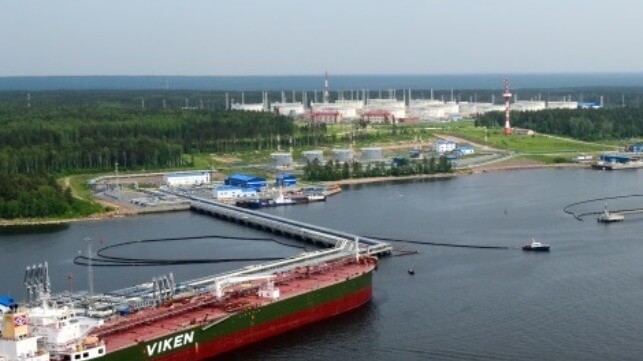Despite Market Challenges, Russian Oil Continues to Flow Unabated

Despite sanctions on Russian banks and Russian shipping, a trend of "self-sanctioning" by Western companies, and a new war-risk designation for all Russian waters, crude oil continues to flow in tremendous volume from Russian loading terminals. The final destination may have changed, but Russian energy exporters are now loading as much oil as they did before the invasion of Ukraine, according to Bloomberg.
Last week, Russian seaborne crude exports averaged four million barrels per day, the strongest pace shown yet this year, Bloomberg reports. However, many of the tankers carrying these cargoes are not broadcasting their destinations. Some of the loadings out of Russia's western ports appear to be headed for the Cape of Good Hope, bound for Asia. This is a far longer delivery route than the traditional trading pattern for crude oil from western Russia, which is typically sold into the European market. In the Russian Far East, loadings of the Sokol blend at Sakhalin Island - within easy reach for East Asian buyers - are reportedly sold out through May.
According to trading sources, Russian oil is selling at an unheard-of discount of up to $30 per barrel below Brent. That is 20-30 percent off to going rate in an era of sky-high oil prices, and it is proving to be a tempting offer for buyers outside of Europe. India - which has a longstanding arms-trading relationship with Russia - has ramped up its purchases of Russian crude oil, and commodity firm Kpler reports that Indian buyers have taken in about six million barrels since the start of March. The uptick is enough that it has attracted the attention of the White House: U.S. President Joe Biden held a call with Indian Prime Minister Narendra Modi on Monday to convey "very clearly that it is not in their interests to increase that," a White House spokesperson said.
While it comes at a political price, the continued flow of Russian crude oil may provide a short-term advantage to the world economy. According to U.S. Treasury Secretary Janet Yellen, a full ban on Russian oil exports would send energy prices "skyrocketing" and impact the economies of America's allies in Europe.
"Our goal from the outset has been to impose maximum pain on Russia, while to the best of our ability shielding the United States and our partners from undue economic harm," she told the House Financial Services Committee last week. "Unfortunately, many of our European partners remain heavily dependent on Russian natural gas, as well as oil, and they are committed to making the transition away from that dependence as rapidly as possible."
